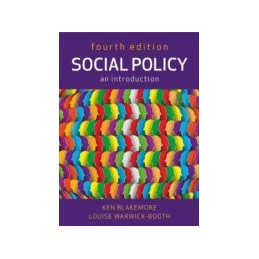- Reduced price

Order to parcel locker

easy pay


 Delivery policy
Delivery policy
Choose Paczkomat Inpost, Orlen Paczka, DHL, DPD or Poczta Polska. Click for more details
 Security policy
Security policy
Pay with a quick bank transfer, payment card or cash on delivery. Click for more details
 Return policy
Return policy
If you are a consumer, you can return the goods within 14 days. Click for more details
The fourth edition of this highly respected textbook provides a clear andengaging introduction to social policy.
The book has been thoroughly updated to include::
This textbook has always been a useful teaching resource because it combines substantial and engaging analysis with stand alone extracts. The new edition adds a chapter on global social policy, updates on the Coalition Government and guides to what is in the book. The added activities are well thought out and can be adapted or expanded to suit the needs of particular students.
Hedley Bashforth, Teaching Fellow in Social Policy, University of Bath, UK
Social Policy:: An Introduction, now in its fourth edition and eleventh year, will remain a core social policy text on reading lists across the country due to its well written and comprehensive nature. Completely revised, it has been updated and extended to reflect contemporary developments in social policy, including the policy implications of the Coalition Government, and now includes a chapter on global social policy environments reflecting the continued internationalisation of social policy debates. Updated pedagogical features, which include activities for the reader, learning outcomes at the start of each chapter and detailed case studies throughout, enhance this thought-provoking and stimulating text.
Dr Liam Foster, University of Sheffield, UK
This book provides, as it states, an introduction to the field and does so by adopting a highly attractive pedagogic style that evidences, at every turn, a sensitivity to the approaches to learning of contemporary students. Although it is tailored to meet the needs of primarily first year specialist students, it is equally suitable for those on other programmes who are taking an option in social policy. Because the book anticipates theoretical issues and debates and students will confront as they progress to a more advanced level, it will also retain value as be a longer-term reference resource. I will certainly be citing it on a second year core course I teach.
It is immediately clear that a great deal of thought has been invested into designing this book. What Blakemore and Warwick-Booth have produced is a clearly laid out and well-structured analysis of impressive breadth that is a readily accessible learning instrument both for student and teacher. Importantly, it provides numerous opportunities to experiment with new ways of approaching the teaching of the subject.
Each chapter sets out clearly expressed learning outcomes with a fair balance of theoretical and empirical concerns. Visual displays in box material, graphs and flow charts provides a most effective means for absorbing the large amount of ground covered. There is good incorporation of statistical material and up to date policy developments. Students are also encouraged to exploit useful links to internet and other media sites. Particularly attractive from a teaching point of view are the range of tasks set for the students which are aimed clearly at rapid capacity building. Chapters end by listing the key terms and concepts addressed to aid revision of material. This is repeated in the glossary at the end of the book. Most of the materials are derived from the British context, but there is also a secondary focus on EU member states and beyond, as well as a good chapter on global social policy.
Steen Mangen, Department of Social Policy, London School of Economics and Political Science, UK
Data sheet
The subject of social policy
Ideas and concepts in social policy
The development of social policy in Britain
The global social policy environment
The contested boundaries of social policy: the case of criminal justice
Who gets what? Slicing the welfare cake
Social policy, politics and social control
Who makes policy? The example of education
Work and welfare
Are professionals good for you? The example of health policy and health professionals
Utopia and ideals: housing policy and the environment
Community and social care
Devolution and social policy
Conclusion: the future of social policy
Glossary
Bibliography
